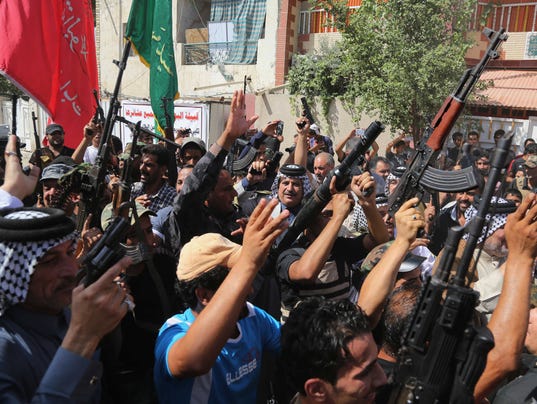
Iraqi Shiite tribal fighters raise their weapons and chant slogans against the al-Qaeda-inspired ISIL in Baghdad’s Sadr city on June 14, 2014.(Photo: Karem Kadim, AP)
As insurgents took more territory in Iraq on Saturday, Secretary of State John Kerry stressed to allies and countries in the Gulf region the importance of coming to Iraq’s aid as an al-Qaeda splinter group continues to make gains.
According to the State Department, Kerry spoke with Iraqi Foreign Minister Hoshyar Zebari offering assurances that the U.S. is committed to supporting Iraq.
Secretary of Defense Chuck Hagel ordered an aircraft carrier into the Persian Gulf as the U.S. weighs options for responding to the situation.
The aircraft carrier USS George H. W. Bush will move into the Persian Gulf, where it will be accompanied by a guided-missile cruiser and destroyer, according to a statement by Pentagon press secretary Rear Adm. John Kirby.
“The order will provide the Commander-in-Chief additional flexibility should military options be required to protect American lives, citizens and interests in Iraq,” the statement said.
Also on Saturday, insurgents seized the small town of Adeim in Diyala province 60 miles north of Baghdad after Iraqi security forces withdrew. That followed the fall of Mosul and Tikrit this week into the hands of the Islamic State of Iraq and the Levant (ISIL).
The Sunni group aims to establish an Islamist state spanning Iraq and Syria, where they are also fighting.
Jawad al-Bolani, a lawmaker and former Cabinet minister close to Prime Minister Nouri al-Maliki, said a military offensive was underway Saturday to drive the insurgents from Tikrit, Saddam’s hometown north of Baghdad, although fighting in the area could not be confirmed.
Major-General Qassim al-Moussawi, spokesman for the Iraqi military’s commander in chief, said Iraq’s armed forces have “regained the initiative” in the north and northeast, blunting ISIL advances and regaining control of some localities.
About 750,000 men lined up at volunteer centers in Baghdad to answer the call by a top Shiite cleric, Iranian-born Grand Ayatollah Ali al-Sistani, to fight the militants, Iraqi broadcaster Al-Baghdadiyah reported.
Al-Maliki, a Shiite widely resented by Sunnis for his perceived sectarian policies, denied the call by al-Sistani was directed against Sunnis, saying it was in fact meant to protect the country and its holy shrines.
“Talk of Sunnis and Shiites must be dropped,” he said, calling for the unity of all Iraqis.
Many volunteers, however, said they had enlisted to protect their faith and shrines at risk in the city of Samarra north of Baghdad and elsewhere. The militants have threatened to march all the way south to the holy cities of Najaf and Karbala, home to two of the most revered Shiite shrines.
“By God’s will, we will be victorious.” said one volunteer, Ali Saleh Aziz. “We will not be stopped by the ISIL or any other terrorists.”



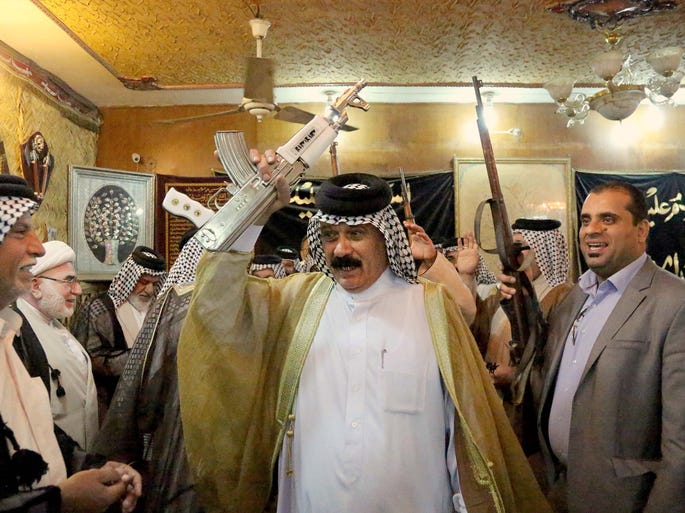

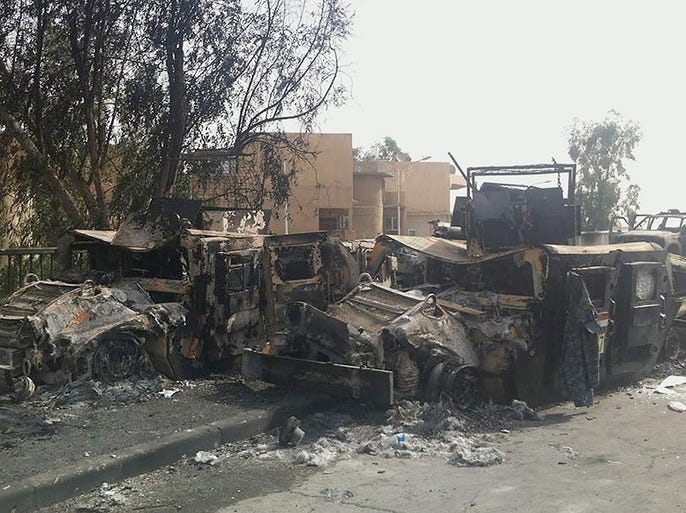




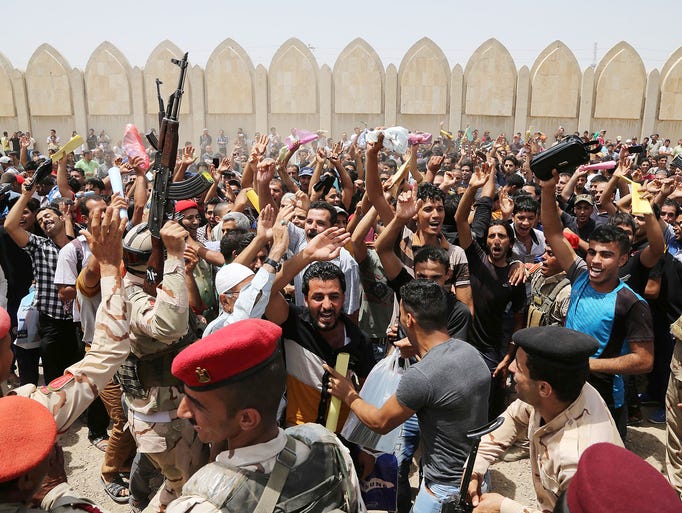
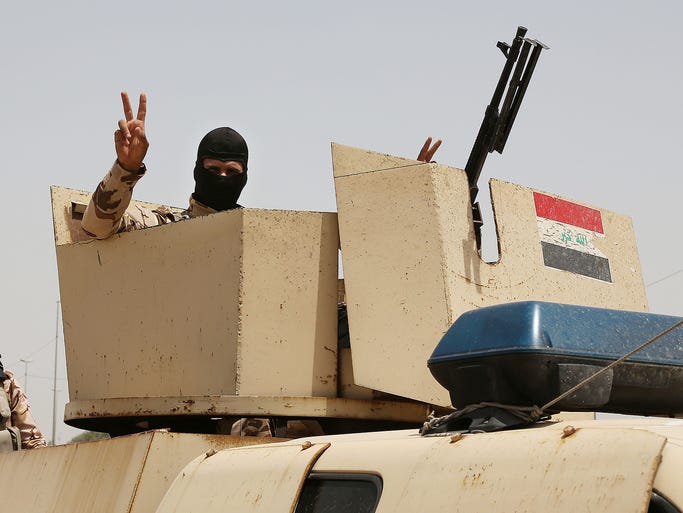



Iraqi officials said there was a massive push to roll back the insurgents’ gains in Tikrit on Saturday, with the help of Kurdish militias known as Peshmerga, the channel reported. They drove out militants who had taken over an army outpost about 15 miles west of the oil city of Kirkuk — which had been abandoned by deserting Iraqi army troops. The Kurds, who have an autonomous republic in the north, took control of Kirkuk after the Iraqi army withdrew.
Meanwhile, Iraqi officials pledged severe punishment for deserting soldiers, whom they blame for the fall of two key provincial capitals earlier this week.
“If soldiers who have left their bases don’t rejoin the nearest unit, this will be considered a crime that could merit the death penalty,” Prime Minister Nouri al-Maliki said.
Al-Maliki tried to put a positive note on the situation of deserters.
“This is our chance to clean and purge the army from these elements that only want to make gains from being in the army and the police,” he said. “They thought that this is the beginning of the end but, in fact, we say that this is the beginning of their end.”
In Baghdad, fallout from the stunning advance in the north was beginning to affect daily life for the city’s 7 million inhabitants.
Some food prices rose dramatically. Army troops went house-to-house searching for militants and weapons in neighborhoods close to vital government installations. The streets of the capital were quieter than usual, and military and police checkpoints made extra efforts to check cars and passenger IDs.
The price hikes were partly the result of transportation disruptions on the main road linking the capital with provinces to the north, but they might also be a telltale sign of a nervous city.
“We were not prepared for this sudden spike in the prices of foodstuff, vegetables and fuel,” said Yasser Abbas, a government employee from Baghdad’s sprawling eastern Sadr City district.
“I do not know how the poor people in Baghdad will manage their life in the coming days. God be with them until this crisis is over because hunger is as dangerous as bullets.”
U.N. High Commissioner for Human Rights Navi Pillay on Friday expressed extreme alarm at the dramatic deterioration of the situation in Iraq, citing reports of summary executions and extrajudicial killings.
“The full extent of civilian casualties is not yet known,” Pillay said. “But reports suggest the number of people killed in recent days may run into the hundreds, and the number of wounded is said to be approaching 1,000.”
She said she was deeply disturbed by reports that ISlL fighters, including prisoners they had released from jails in Mosul and provided with arms, have been actively seeking out — and in some cases killing — soldiers, police and others, including civilians, whom they perceive as being associated with the government.
“We have, for example, received reports of the summary executions of Iraqi army soldiers during the capture of Mosul, and of 17 civilians on one particular street in Mosul City on June 11,” she added.
U.N. officials also expressed concern at the more than 500,000 refugees who fled towns taken over by ISIL.
Residents in Mosul and Tikrit expressed bitterness over the army’s abandonment of residents.
“People in Mosul were not happy with the Iraqi army but they asked for their protection, not for them to leave the city,” said Samir Oda of Mosul. “The soldiers were heading towards Kurdistan — not a single one was left in Mosul. Now we are afraid our city will be destroyed by the government trying to attack the terrorists.”
Many have questioned how it is possible that such a small fighting force as ISIL could take over key cities protected by the military and threaten the capital. But analysts say it was to be expected.
“The key thing to emphasize is that while on paper the Iraqi security forces are numerically enormously superior to ISIL, in these towns and cities the Iraqi militant security forces are relatively light in number,” said Matthew Henman, manager of IHS Jane’s Terrorism and Insurgency Center (JTIC), in London. “They are typically a kind of light infantry force, designed for largely static guard duties, rather than any kind of heavy urban combat.”
By comparison, he says, that ISIL is a highly trained, highly organized and heavily armed force with experience in guerrilla operations from years of fighting in Iraq and also extensive experience in urban and street fighting against conventional army forces.
In the longer term, ISIL cannot easily hold onto the territory it has captured, analysts say.
“What has subsequently happened is that the security forces have rallied and started to take the fight back to ISIL and to start pushing them back,” said Henman. “Because they are capable of engaging with them and defeating them in open combat. ISIL isn’t so heavily experienced and armed that it is able to engage in conventional, prolonged combat with conventional security forces.”
Still, disaffected Sunnis, Kurdish ambitions, a weak and often corrupt and brutal security force and government could lead to renewed civil war in the worst crisis since U.S. forces withdrew at the end of 2011, analysts say.
Al-Maliki tried to put a positive note on the situation of deserters.
“This is our chance to clean and purge the army from these elements that only want to make gains from being in the army and the police,” he said. “They thought that this is the beginning of the end but, in fact, we say that this is the beginning of their end.”
Contributing: Associated Press
